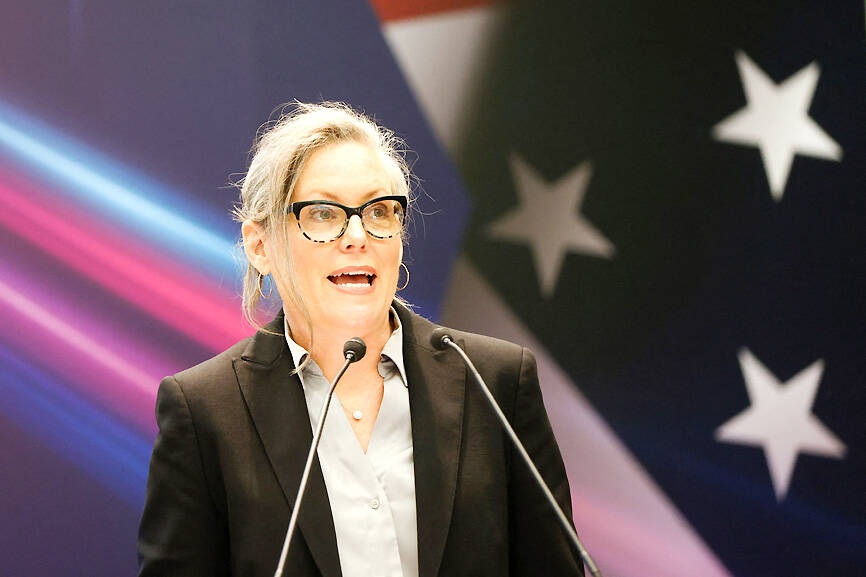Arizona is in talks with Taiwan Semiconductor Manufacturing Co (TSMC, 台積電) about advanced chip packaging, state Governor Katie Hobbs said yesterday, which is crucial for the manufacturing of artificial intelligence (AI) chips.
TSMC, which is building a US$40 billion chip factory in the US state, has not announced plans to build facilities for advanced chip packaging in the US. Advanced packaging processes stitch multiple chips together into a single device, lowering the added cost of more powerful computing.
“Part of our efforts at building the semiconductor ecosystem is focusing on advanced packaging, so we have several things in the works around that right now,” Hobbs said on the sidelines of the US Business Day investment forum at the Taipei International Convention Center.

Photo: Carlos Garcia Rawlins, Reuters
US National Institute of Standards and Technology Director Laurie Locascio, who also serves as US undersecretary of commerce for standards and technology, said at the same forum that the US is talking to TSMC about research and development for the first time, in an effort to bring more of the world’s biggest contract chipmaker’s technology onshore.
TSMC counts US-based Apple Inc and Nvidia Corp among its major clients.
Driven by a surge in demand for AI chips, TSMC has been unable to fulfill customer demand for advanced packaging services and has been rapidly expanding capacity, including a nearly NT$90 billion (US$2.81 billion) investment in a new facility in Taiwan.
The Hsinchu-based company expects supplies to be tight for another 18 months, TSMC chairman Mark Liu (劉德音) said at the Semicon Taiwan trade show in Taipei earlier this month.
At the same event, Cadence Design Systems Inc CEO Anirudh Devgan said that packaging would be the key battleground for nations seeking to establish tech leadership.
In July, TSMC said its Arizona plant would be delayed until 2025 because of a shortage of specialist workers, and that it was sending technicians from Taiwan to train local staff.
Production had been due to start next year.
Hobbs said she that did not expect further delays.
“The project is going well in Arizona. I’m very impressed by the speed with which it’s been built, and we are working through bugs and expect it to continue on schedule,” she said.
Hobbs said she met TSMC executives on Monday.
“We talked about our continued partnership, their investments in Arizona, how we can continue to address any issues that come up,” she said. “We’re continuing to make sure that we have the skilled workforce that’s needed, both on the advanced manufacturing side, but also the construction side so that we can continue these investments.”
TSMC said in a statement that it was “honored” to host Hobbs at its headquarters where executives held “productive discussions” with her. “We believe the dialogues that we held during this visit will help us to work together even more closely in the future,” the company said.
Later yesterday, President Tsai Ing-wen (蔡英文) met Hobbs at the Presidential Office and said that TSMC’s Arizona plant was a symbol of cooperation.
“These joint efforts also will help us create more secure and resilient supply chains,” Tsai said.
Hobbs said that Arizona was proud to be chosen to host TSMC’s chipmaking plant in the US.
The relationship between Taiwan and Arizona is one of the most significant partnerships in the world, she said.
Since 2017, the value of trade between Taiwan and Arizona has totalled more than US$3.27 billion, and the state looks forward to exploring more opportunities to collaborate with the nation, Hobbs said.
Additional reporting by Chen Yun and Bloomberg

South Korea’s equity benchmark yesterday crossed a new milestone just a month after surpassing the once-unthinkable 5,000 mark as surging global memory demand powers the country’s biggest chipmakers. The KOSPI advanced as much as 2.6 percent to a record 6,123, with Samsung Electronics Co and SK Hynix Inc each gaining more than 2 percent. With the benchmark now up 45 percent this year, South Korea’s stock market capitalization has also moved past France’s, following last month’s overtaking of Germany’s. Long overlooked by foreign funds, despite being undervalued, South Korean stocks have now emerged as clear winners in the global market. The so-called “artificial intelligence

NEW IDENTITY: Known for its software, India has expanded into hardware, with its semiconductor industry growing from US$38bn in 2023 to US$45bn to US$50bn India on Saturday inaugurated its first semiconductor assembly and test facility, a milestone in the government’s push to reduce dependence on foreign chipmakers and stake a claim in a sector dominated by China. Indian Prime Minister Narendra Modi opened US firm Micron Technology Inc’s semiconductor assembly, test and packaging unit in his home state of Gujarat, hailing the “dawn of a new era” for India’s technology ambitions. “When young Indians look back in the future, they will see this decade as the turning point in our tech future,” Modi told the event, which was broadcast on his YouTube channel. The plant would convert

‘SEISMIC SHIFT’: The researcher forecast there would be about 1.1 billion mobile shipments this year, down from 1.26 billion the prior year and erasing years of gains The global smartphone market is expected to contract 12.9 percent this year due to the unprecedented memorychip shortage, marking “a crisis like no other,” researcher International Data Corp (IDC) said. The new forecast, a dramatic revision down from earlier estimates, gives the latest accounting of the ongoing memory crunch that is affecting every corner of the electronics industry. The demand for advanced memory to power artificial intelligence (AI) tasks has drained global supply until well into next year and jeopardizes the business model of many smartphone makers. IDC forecast about 1.1 billion mobile shipments this year, down from 1.26 billion the prior

People stand in a Pokemon store in Tokyo on Thursday. One of the world highest-grossing franchises is celebrated its 30th anniversary yesterday.